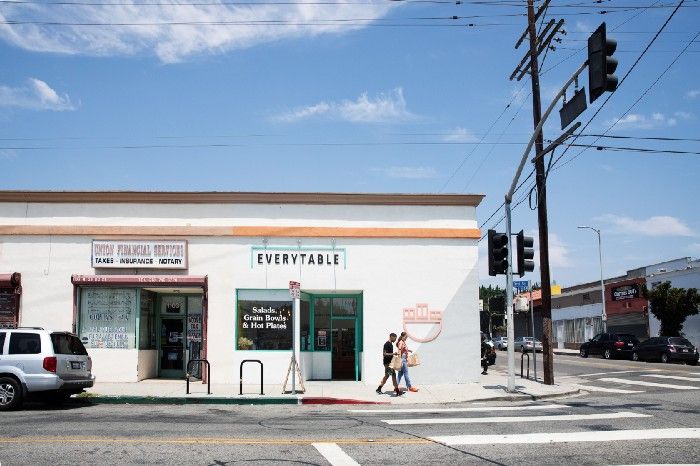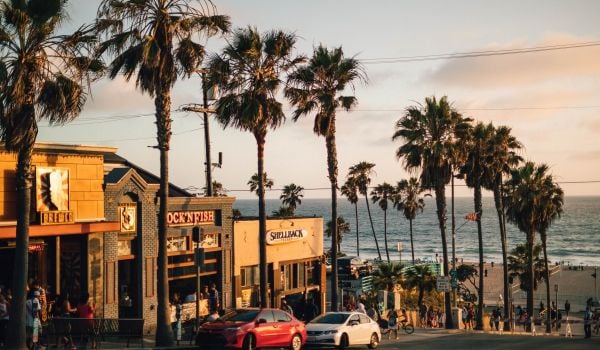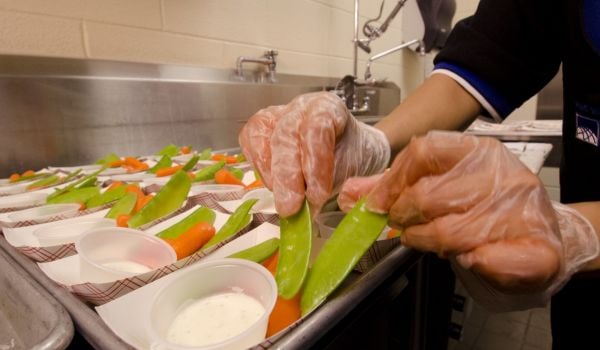A select few in Los Angeles will soon have the opportunity to own their own franchise business with no money up front, no collateral requirements, no credit score minimums, and no minimum net worth. They’ll be paid a salary while they are going through an initial 6-12 month training program and they’ll be guaranteed their first three years in compensation as new franchise location owners with Everytable, a five-year old grab-and-go restaurant startup in Los Angeles.
In addition to its healthy meal offerings, Everytable is known for its variable pricing — the chain’s prices are tied to the median income of the neighborhood around each location, with meal prices ranging from $4 in low-income neighborhoods to $9.75 in wealthier ones. Right now, as the social equity franchising program director at Everytable, Bryce Fluellen is focusing on building a pipeline of candidates for those new franchise ownership positions.
The program has one candidate already in training — Dorcia Whitebrake, currently a general manager at an Everytable location. Fluellen expects to recruit more candidates from within Everytable’s existing ranks. He’s also forming partnerships with community-based organizations around Los Angeles that already have entrepreneurship training or assistance programs, including one group he says is tied into local community colleges.
“A lot of Black folks have faced redlining and disinvestment for decades, so this is about how do you create an opportunity for folks who are talented, who have the business acumen, have the ability, but just don’t have the capital to get into conventional franchise networks,” says Fluellen, a trained chef who has also worked with basketball legend-turned-business mogul Magic Johnson.
It’s ironic because franchising itself has long been sold as the easier route to business ownership for people without formal qualifications or personal wealth. But the reality of franchising is much more fraught than that simplified narrative, especially when you account for the inevitable ways that racial and power disparities constantly plague the history of just about anything in America.
In “Franchise: The Golden Arches in Black America,” released last year, author and historian Marcia Chatelain documents the complicated history of franchise businesses and Black communities — or what she calls “the hidden history of the intertwined relationship between the struggle for civil rights and the expansion of the fast-food industry.”
Franchising wasn’t invested by the fast-food industry. Chatelain cites business scholars who trace franchising to the Catholic Church in the Middle Ages, when tax collectors were allowed to keep a portion of revenues retrieved from citizens. Coca-Cola, first made in 1888, licensed franchisees to mix, bottle and sell their iconic product in drugstores and later restaurants across the country. In corporations’ hands, franchising became a powerful tool to generate profits and shove off risk to external parties.
“This form of commercial development allows corporations to pass on their liabilities to third-party suppliers, franchisees, and to some degree, local governments,” Chatelain writes. “Cities eager to attract businesses subsidize business growth through the preparation of land, by providing increased policing, and by offering tax breaks.”
“Franchising is a big business in America because it may be the most American idea in the world,” she writes. “An individual with no formal training or education can become a business owner — maybe even a millionaire — with only an owner’s manual and sheer will. Franchising was the channel for converting a couple of ice cream parlors or a few hot dog outfits into multibillion-dollar businesses, with the power to influence supply chains, workers’ wages, and global tastes.”
But, as is so often the case in America, access to that kind of success largely depended on race. The earliest franchisee success stories were almost exclusively stories of white men. It wasn’t till after 1964, when the federal government outlawed refusing customers on the basis of race, that franchisors — the billion dollar corporations that license franchise owners — started slowly accepting non-white members.
Under the Nixon administration, the Small Business Administration expanded its support for financing and other assistance to franchise businesses, promoting the opportunity to Black communities. But this was occuring at the same time the administration infamously undermined any efforts to enforce anti-segregation policies under the 1968 Fair Housing Act. Efforts emerged to transfer white-owned franchises in Black neighborhoods into at least partial Black-ownership — some organic among local franchise operators and some under formal programming from the SBA and franchisors.
And yet in the fourteen years since McDonald’s approved its first Black-owned franchise license to Herman Petty on the south side of Chicago in 1968, there were still fewer than 150 Black McDonald’s franchisees in a system of nearly 8,000 locations across the country, in which, Chatelain says, many white owners had multiple locations but few Black owners did.
Lawsuits throughout the years have alleged that the few Black franchise owners that do have a foothold in the company have been denied the opportunity to open locations in non-Black areas. One suit, which drew national attention, was settled in the franchisee’s favor for $4.7 million out of court.
Troubling patterns have persisted. In 2019, CNBC reported on Black McDonald’s franchisees leaving the chain as the disparities grow between them and white franchisees.
And that’s not even touching on how, through franchising, fast food remains abundantly available in Black communities while fresh and healthier options are relatively much harder to find.
“In terms of food justice or the food apartheid, there’s so much talking about these issues in terms of how people make bad decisions, but no talk about how fast food corporations shape the choices available,” says Chatelain in an interview with Next City. “We have to tell the full picture of how development and subsidies and incentives are made economically that really do prioritize a certain type of business.”
Everytable is attempting to break out of those historic patterns, starting with the fact that it’s selling healthy options. Fluellen himself comes out of the healthy foods world — before joining Everytable, he was serving as the chef for the American Heart Association’s Cook with Heart program in the LA area.
It’s also making franchising available to many more people. At other companies, it’s typical for aspiring franchisees to need $500,000 or more in personal net worth — seen as an indicator of financial responsibility as well as the capacity to weather a few money-losing years while a new location gets on its feet. Franchisees are also typically responsible for personally finding the capital to finance any acquisition or buildout for their locations. Fluellen says it took some convincing for Everytable’s philanthropic investor partners to not just reduce these requirements but eliminate them.
“It was really looking at what is one of the top barriers for people of color being able to own their own business,” Fluellen says. “I can speak for myself, I had a catering company for a number of years, with some friends and family startup funding, but I still have no generational wealth, not even $20,000-$30,000 stashed away anywhere. That’s the biggest hurdle. Looking at what I have on paper, just because I don’t have the net worth doesn’t mean I don’t have the acumen.”
Fluellen says the company is shouldering the burden of finding locations and negotiating leases. It’s an essential function within their variable pricing model, since the higher and lower income neighborhood locations have to have a certain balance for the whole network to be financially sustainable. But it also means new franchisees coming out of its social equity franchising program won’t have to take on the task of finding a location themselves, especially during a complicated time for commercial leasing under a pandemic that doesn’t seem to be going anywhere for now.
“We have a pipeline of locations we’re negotiating leases for right now,” Fluellen says. “Some of those stores are in historically underserved areas, but just because it’s underserved doesn’t mean it can’t be successful. Our store in Compton is one of the most profitable right now. We’re doing that due diligence ourselves. As people come through the system we’ll identify locations that are ready when they’re ready. Others may be ready before the locations are ready and so they’ll work at another location in the system until they’re ready.”
Everytable is also financing any buildout that would normally be financed by a franchisee taking out a loan from a bank. The chain borrowed $2.5 million in below-market rate loans from foundations, which it is using to finance buildouts for social equity franchise locations. The franchisee will have to pay back Everytable for any funds used for building out their location, with 1-2 percent in interest, but Fluellen says they won’t have to start paying back Everytable until the location is profitable. Meanwhile, Everytable is raising more funding to add to that $2.5 million pot.
In some ways it sounds too good to be true, and Chatelain warns that often that is the case in a capitalist economy such as this one. If Everytable doesn’t succeed as a company, the ultimate measure of its model will be whether the burden of that failure falls mostly on the franchisees and workers or on the franchisor and its investors. Too often it is the former, leading some to call for tighter franchise regulations. Fluellen says Everytable is building safeguards into its program to mitigate that potential scenario.
“We want to ensure that everything aligns with the mission and purpose of what we’re trying to accomplish, and that’s setting up folks for success on all sides,” Fluellen says.
More broadly, Chatelain also warns against franchising and small business ownership becoming a glittering distraction from the broader work required to address persistent racial disparities in wealth, income, health and other measures.
“There’s so many different issues out there to create an equitable world, and not one piece that can solve for all that,” Fluellen says. “Government plays a role, business plays a role. It’s not one person’s problem, it’s a whole society problem. This is a marathon. We’re just taking the baton. I’m obligated to do my part and do my work. It won’t end while I’m here but that doesn’t mean I shouldn’t contribute.”
This article is part of The Bottom Line, a series exploring scalable solutions for problems related to affordability, inclusive economic growth and access to capital. Click here to subscribe to our Bottom Line newsletter.

Oscar is Next City's senior economic justice correspondent. He previously served as Next City’s editor from 2018-2019, and was a Next City Equitable Cities Fellow from 2015-2016. Since 2011, Oscar has covered community development finance, community banking, impact investing, economic development, housing and more for media outlets such as Shelterforce, B Magazine, Impact Alpha and Fast Company.
Follow Oscar .(JavaScript must be enabled to view this email address)


















